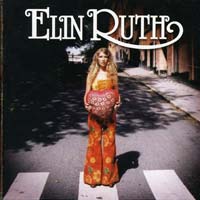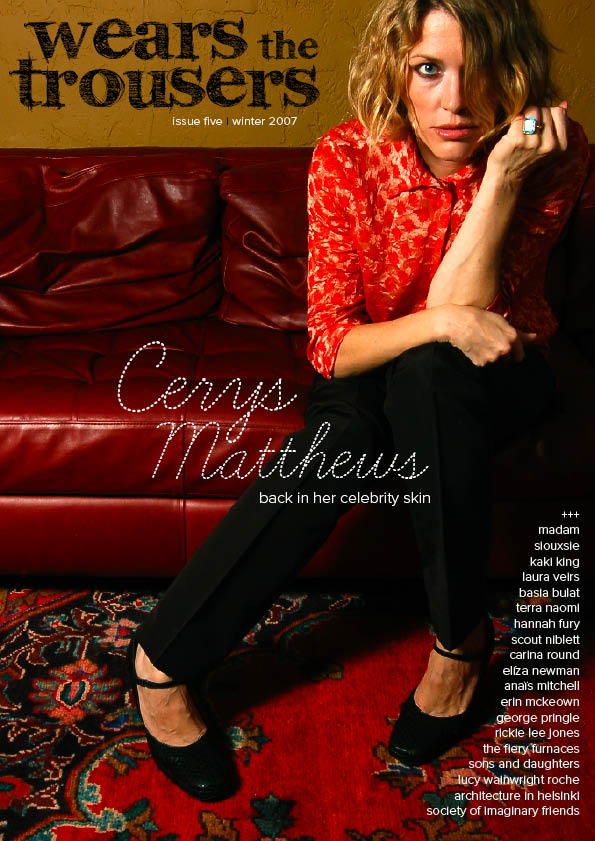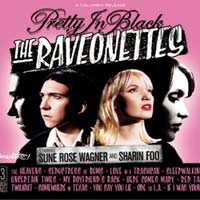Filed under: news, trouser press | Tags: 2008, alan pedder, andrea corr, anna mackmin, kathy burke, kevin spacey, meryl streep, music, news, niamh cusack, richard raymond, scarlett mackmin, the corrs, the old vic

Singer to star in new production of award-winning Irish play
Unveiling the Old Vic theatre’s upcoming Spring 2009 season, artistic director Kevin Spacey revealed that Andrea Corr is to make her London stage debut next February in a play retelling the events of a month in the life of five impoverished, unmarried sisters living together in 1930s rural Ireland.
‘Dancing At Lughnasa’, written by Omagh-born playwright Brian Friel, premiered in 1990 in Dublin and went on to win Tony and Olivier Awards (among others) for best and best new play. It was later made into a film starring Meryl Streep, Michael Gambon, Kathy Burke and Rhys Ifans.
Filed under: album, back issues, film & dvd, live, review | Tags: alice russell, andrea corr, anja mccloskey, anna claxton, beth rowley, bic runga, elin ruth, gary munday, gem nethersole, jean lynch, julia paynter, kate rusby, lou rhodes, matthew smith, paul woodgate, rainer maria, raveonettes, revl9n, richard raymond, robbie de santos, robinella, robyn, rodrigo y gabriela, rogers sisters, tiffany daniels, trevor raggatt
The following reviews were all published on our old website between May 2005 and December 2006.
_________________________________________________________________________________________

Rainer Maria
Catastrophe Keeps Us Together •••
Grunion
Although it’s highly likely that most of the UK populace won’t have heard of Rainer Maria, they’ve been right around the block in the last ten years cooking up the sort of music that the phrase ‘kickass’ might have been coined for. On this, their sixth album, the band indulge in some mostly straightforward but catchy rock ‘n’ roll, with Caithlin de Marrais and her two male musical brethren forging a literate but hopelessly angst-ridden connection with the listener. Poetic lyrics are carried along by strong and feisty vocals reminiscent of Nerina Pallot (a lot), Tanya Donnelly (a little bit) and Meredith Brooks indulging in a catfight slanging match, mixed with a little of the New Man emo stylings of Jimmy Eat World.
Despite their obvious academic influences, you can’t help but feel that much of Catastrophe Keeps Us Together sounds as if it’s been plucked from the bedside table chick-lit of a high school sweetheart. Here is a band that perhaps has the potential to appeal to a wider market than they currently manage to reach; note the word ‘perhaps’, however, for it’s equally possible that from seemingly trying so desperately to appeal to the younger kids, the band may actually be alienating their older audience who may fondly remember the genre from the first time around.
Springing from the slacker generation in smalltown Wisconsin a decade or so ago, a cursory listen may condemn Rainer Maria to be shrugged off as just another indie band cryogenically frozen somewhere circa 1992 and, now defrosted, trying to regain their hipster points and cool mystique. There’s more to them than that, however, and a little extra effort on your part might well go a long way. Though they might have done better than to embrace the ‘Reality Bites’ school of songwriting with its punchy, gutsy beats and dance-along riffs that proceed from ‘Life Of Leisure’ all the way to ‘Clear & True’, it’s not until you reach the sweetly fragile ‘Terrified’ that you notice quite how empty the sentiments of the other songs are in hindsight.
Still, it’s the quieter songs that succeed best on the album with their more mature and less dated outlook. Here, de Marrais’s voice softens, becomes vulnerable and innocent, even childishly beautiful, and wonderfully complemented by her bandmates’ sensitive playing. Even so, it’s a little worrying that the best performance on the album by far is a cover of Bob Dylan’s ‘I’ll Keep It With Mine’. Perseverance and repeated plays of the album begin to open up the rest of the songs. So if you’ve got a little patience, sticking with Catastrophe… might just be enough to make a lifelong convert of you.
Anna Claxton
originally published July 25th, 2006
__________________________________________________________________________________________
The Raveonettes
Pretty In Black ••••
Columbia
Fronted by the six-foot icy platinum blonde Sharin Foo and the deep, dark and handsome Sune Rose-Wagner, the mighty Raveonettes have tended to receive more press for writing entire albums in one key – 2002’s Whip It On in Bb minor and 2003’s breakthrough Chain Gang Of Love in a sunnier Bb major – and for heavy feedback than for the pop perfection that was the result of this concept writing and recording. Three years and as many albums in, the duo have thrown out the rulebook and delivered their strongest record yet. They’ve always had a penchant for the 1960s and faded Hollywood B-movie glamour (they have written three songs about LA), but it seems that only without those self-imposed musical restrictions that they have been able to embrace these themes fully.
Lead single ‘Love In A Trashcan’ conjures up an image of Carnaby Street in 1967, with girls in go-go skirts and huge platform heels furiously shaking their shoulders to its twangy, sassy guitar lines. In ‘Sleepwalking’, Foo sings in a husky, sultry Debbie Harry-like voice, and the dramatic quiet–loud guitar chugs could indeed have come from one of the darker moments on Blondie’s Parallel Lines. But it’s when the duo play the kitsch card that Pretty In Black hits the pop climax. In ‘Ode To LA’ and their cover of The Angels’s ‘My Boyfriend’s Back’, they ham the 1960s motif to the max, with handclaps, woah oh oh ohs, sleigh bells, timpani drums, Ronnie-freakin’-Spector! It’s as if Radiohead had never happened.
The simplicity of these songs is the key to their success as great pop. Rose-Wagner has always expressed his love for the tragi-pop of ’60s girl groups like The Shangri-Las, The Ronettes and just about everyone else Phil Spector ever produced. It’s no surprise then that on around half of these songs, The Raveonettes make it happen again. Many have that same muffled desperation, sung through gritted teeth and sugar-sweet pop harmonies. Unfortunately, a few songs towards the end of the album grow tiresome and some of the glistening production begins to grate. While they do not detract from the brilliance of the album’s strongest moments, they can hamper its flow, and the amiability that the heavy feedback and mono production brought to the earlier albums isn’t so strong. Yet despite this perhaps inevitable trade-off between authenticity and charm, this is still a great album, just not for the same reasons as their previous efforts.
Robbie de Santos
originally published August 18th, 2005
__________________________________________________________________________________________

Amy Ray
Prom ••½
Daemon
You can just see the headlines… INDIGO GIRL IN GARAGE BAND SHOCKER!… and, indeed, Prom may take some fans of the colourful folky twosome by surprise. For her second solo outing, Amy Ray charges further down the rocky road of 2002’s Stag, casting out the Lilith Fair staples of acoustic guitars, interweaving harmonies and subtle poetics in favour of a straight up, 1970s-tinged garage band ethos. Weighing her musical anchor in the sounds of her youth is certainly appropriate given the over-riding theme of the album – teenage rites of passage, sexual awakenings etc., all as implied by the title – and that’s both the record’s blessing and its curse. Where the Indigo Girls as a unit tend to lavish each song with subtle washes of meaning and texture, Prom, to quote the great philosopher Shrek, simply “don’t have layers.” And whilst this single-minded agenda can be a strength in terms of bringing a common focus and sense of coherence, it sure does wear you down, too often spilling over into one-dimensionality and hammered-home polemic. Fortunately, Ray is too good and experienced a songwriter to render Prom entirely no mouth, all trousers; the subtler songs will stick where the bombast fails.
To her credit, Ray admirably battles her early demons and formative experiences in a way that provides an opportunity for catharsis, particularly where matters of sexuality and the teenage trauma of accepting one’s self are concerned. It’s a shame then that the result is not more insightful and considered. Though she sings of important and involving topics, they often seem to suffer from an apparently shallow treatment laced with invective, as if she were seeking to shock rather than to enquire and inform. For instance, ‘Rural Faggot’ might as well be paraphrased as “It’s rough growing up as a young gay man in an isolated, avowedly red-neck community. Maybe life would less awkward if you’d lived in Greenwich Village. Yeah!” – and it’s a real pity because elsewhere in the song are a few lines of gorgeous, evocative imagery, and many of the other songs fall at this same hurdle. Ray’s sometimes striking similes and scenes are robbed of any apparent subtext, and therefore pass by all but unregarded.
It must be conceded, however, that even the less effective songs are at least workmanlike, pushing along with a pre-punk sense of purpose and the tunes are perfectly hummable. The album does contain a few real gems too; ‘Driver Education’ motors along with Farfisa organ motifs burbling in the background, evoking images of American high school life, while ‘Sober Girl’ recalls Billy Idol’s ‘White Wedding’, perhaps as covered by Iggy & The Stooges. Compelling stories of sexual confusion and youthful exploration are spun on ‘Covered For You’ and ‘Pennies On The Track’, while the uncharacteristically Indigos-esque closer ‘Let It Ring’ successfully blends acoustic guitars and mandolins with more strident, rockier sounds. Rounding squarely on the intolerance and prejudice shown to the gay community, in particular by the conservative churches in the US and elsewhere, it draws the thematic curtains of the album to an aptly vocal close.
Trevor Raggatt
originally published January 21st, 2006
__________________________________________________________________________________________
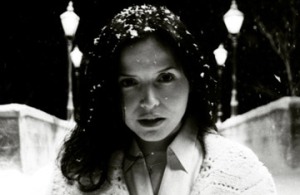
Richard Raymond
The Bridge, starring Andrea Corr ••••
Rating 12
In her office, late at night, Mary (Andrea Corr), a psychologist, takes a voicemail from the father of a girl who has committed suicide whilst under her care, urging her that it’s time to ‘let go’. Having lost her position through this unfortunate event, Mary finds it very hard to do so, and scribbles down the man’s number only to see it vanish beneath the remnants of a teacup, upended by her friendly cat. An attempt at remembering the number leads to a call to an elderly man, Simon (Leonard Fenton), who only moments before was poised, barefoot on a snowy ledge, about to leap to his death into the dark waters below…
Against the shadowy silhouette of the bridge, blue-tinged and feathered with falling snow, director Richard Raymond elicits a magical and haunting sense of other-worldliness, the stylised heightened reality an escapee of a Tim Burton landscape, demonstrating all of Burton’s delicious dark melancholy but devoid of his black humour. However, this is no triumph of style over substance: Raymond gently unfurls his tale, Mary at first still as she receives the message, her agitation growing as she takes the call from Simon and realises he is on the brink of killing himself, and then her flight into the night as she attempts to lay her own ghosts to rest by saving another, all leading to a taught and chilling climax.
Whilst an interesting combination, there may not be the highest of expectations for the pairing of the lead singer of a pop group with Doctor Legge from ‘Eastenders’. In that case, be prepared for a most pleasing surprise. The pacing of the film is dependent on the camera exploring the performers’ actions and gestures and, within their dialogue, to linger on their expressions. As such, any mis-timing or errors would be magnified to the audience. That they both deliver convincing, gripping and moving performances is a credit to both actors and Raymond as director. Corr, previously seen in ‘The Commitments’ and ‘Evita’, the Madonna vehicle in which she was criminally allowed only one line of what should have been her character’s own song, has her sights set on an acting career and the evidence on display here leads one to suspect she’ll be most successful.
Underplaying rather than overplaying is a most subtle skill and Corr demonstrates this with aplomb. Fenton, meanwhile, ranges from pathos to simmering rage, as his anger at his life erupts and, his face a close-up of crevice shadowed contortion, bores into the viewer. The interplay between seasoned thespian and fresh-faced newcomer is nicely balanced, and the unlikely two-hander deftly explores a range of human emotions. As the falling snow is by turn luminescent white in the lamplight, or midnight blue against the darkened night, it reflects how the film’s themes of regret, guilt, blame, loyalty and redemption are rarely black or white but instead change, Monet-esque, dependent on the light in which they’re seen.
Are there flaws? One or two, but even these are debatable. The plot is stretched slightly and could be shorter, but to lose the slow-burning build would almost certainly detract from the atmospherics of the film. The ending, too, is not as dramatically climatic as one has been led to suspect, but it is satisfying and quite haunting, resolving itself and yet is ambiguous enough to leave the viewer revisiting the tale in the mind’s eye. ‘The Bridge’ has already attracted a considerable fanbase and plaudits from home and abroad. It’s legacy will be as a beautiful, melancholy calling card that heralded the beginning of a most promising career for both its director and its leading lady, but one which will remain a favourite in it’s own right in any viewer’s personal film collection.
Jean Lynch
originally published September 1st, 2006
__________________________________________________________________________________________

Revl9n
Revl9n ••½
Because
Revl9n (originally named and still pronounced ‘Revlon 9′) make dirty disco death karaoke with leather boots, glitter and tiny, cheap, fantastic drum machines, packing in enough appeal for any frustrated gyrating scenester to get their filed polished teeth into. Those who like to bask in the raw musical power of a dominant woman will find much to enjoy here, but the more straight-edged listener who isn’t into haute couture music and requires a background to their random hip thrusts and mechanical arms may well find this debut album too much or, equally, too little to get excited about.
With their roots running deep within the sleazy urban fashion scene, it’s surely no coincidence that the trio’s name is twinned with a universally renowned hair product (no plug intended). Their reasons for changing it were presumably legal, but who knows. It’s apt and that is all. That they hail from Sweden is hardly surprising; the country has a proven track record in spawning ice cool throwbacks proud to have missed their true genre generation by decades, somehow managing to pull off all the shots that their forerunners did but with twice the effect – The Raveonettes and The Peepshows being particularly apt examples.
Beneath the breathily suggestive vocals of serial heartbreakers Maria Eilersen and Åsa Cederqvist lies the random guttural urges and robotic tampering of Nandor Hegedüs and his vast array of machines. Listen once and you’re dropped behind the gleaming eye of a high-powered filter lens peering down the inner sanctum of a smoky club draped with bastard fashion art and futuristic lightning; at the far end, there’s a catwalk down which the two women strut and point and rack up the heat. This is the beauty of Revl9n in all its grandeur – straight out of the glossy pages, ragged and overtly horny.
Listen again, however, and the constant club thumps, rhythmical pouting, sometimes ill-advised samples and old-school keyboard riffing begin to wear thin – the fabric frays, the heels break off and the fur coat whips around and stings you on your peachy, bronzed butt. Maybe it’s just that something’s gotten lost in translation with high-camp, cheesy lines like “I feel super fantastic / I feel fucking fantastic”, but whatever it is, the album just doesn’t front up enough genuine likeability to be the new black / brown/ taupe etc.
Being out of your mind on club drugs may be what’s required to enjoy this album as its makers intended. Lyrics like “I’m on my knees / I’m dripping wet / I tie you down / I kinda feel forced / It feels so good” are ridiculous and laughable otherwise. All in all, Revl9n may have muscles but for now they’re only flexing them. Next time let’s see some sweat on those thighs.
Gary Munday
originally published July 23rd, 2006
__________________________________________________________________________________________
Lou Rhodes
Beloved One •••
Infinite Bloom
First impressions? That Lou Rhodes (formerly 50% of Lamb) has joined the burgeoning underground army of waifs armed with an acoustic guitar, a penchant for Martha’s Harbour-era self-sufficiency and a Joni fixation. Listening through for the first time, I could almost smell the cherrywood fires and see Crosby, Stills, Nash & Young harmonising over the barbecue. On the surface, Beloved One has all the hallmarks of being nice, safe and harmless. In fact, (whisper it) maybe even bland.
Fortunately, it just goes to show how a little knowledge can be a dangerous thing. Don’t be fooled by the ‘back to the woods’ manifesto – the ‘Good Life’-cum-Amish lifestyle extolled in the (very nice) packaging and homemade art of the booklet are slightly at odds with the warmth, quality and expanse of the recording. The production is exemplary; the instrument separation is balanced and the vocals pushed to the fore. This isn’t Old Ma Rhodes whiling away a harsh winter in the Appalachians with a beat-up acoustic, but a gifted songwriter, numerous musician friends, four recording studios, a plethora of organic instruments and the adventure of creative release from her previous band’s lo-fi format.
Dig a little and there is plenty of musical invention and personal freedom to be found. Rhodes’ sentiments have a disarming honesty that’s displayed in each song, let down only by a tendency to rely on lyrical cliché – “Don’t underestimate simplicity”, “Try to live each day by day”, “Feel each moment new” – and those are all from the very first song. More follow, equally unsubtle. But while they don’t stop coming, neither do they ruin the show. There are hooks too – the heartbeat rhythm of ‘Each Moment New’, the drowsy double bass underpinning ‘In’lakesh’ and ‘Treat Her Gently’s staccato guitar and slowly evolving strings.
In the title track, a hesitant beginning gives way to urgent, driven violin and intermittent passages of pastoral flute. Each song builds on the previous one, the sum of the whole distancing itself from individual moments that casual listeners could be forgiven for thinking bear too many similarities. The best is saved for last with ‘Why’. Although more conventional in its structure than the rest of the album, it’s oozes loveliness. All the first-rate ideas and melodies coalesce into a statement where the simplicity of theme and craft finally hit home. Interestingly, it’s the only song where Rhodes shares a writing credit.
A clarion call for reducing the complexities that surround us, Beloved One rewards continued listening and a reflective mind. By combining the DIY ethos of 1970s folkies with 21st Century production values, it just about hits the spot. Thank goodness for second impressions; this Lamb isn’t lying down, just resting.
Paul Woodgate
originally published March 11th, 2006
__________________________________________________________________________________________

Rilo Kiley
More Adventurous [reissue] •••••
Warner Bros.
“Any chimp can play human for a day
Use his opposable thumbs to iron his uniform”
And so begins Rilo Kiley’s More Adventurous – with a warning shot across the bows to anyone expecting a bland bit of grown-up pop to play in the background. From this instantly evocative couplet onwards, the band’s third full-length demands your constant attention, challenging, amusing, surprising and, yes, titillating the listener. This is hard to justify through words alone, as a simple description of the music itself would merely wind up sounding like yet another jangly-guitar indie band fronted by another waif-like art-college dropout. Which this is not, of course. It is an album full of uplifting songs of heartbreak, instability, cynicism, lack of trust and loss, performed with utterly accomplished aplomb. And throughout, the undeniable star of the show is Jenny Lewis’s voice – snarling, crooning and lilting its way around her razor-sharp lyrics. Indeed, their occasional proximity to the bone is only heightened by Lewis’s refreshingly uncluttered and honest style.
As far as indie credentials go, Rilo Kiley’s are flawless: a self-released EP and album that was then picked up by Barsuk Records (the recently re-released Take Offs & Landings); adoption by the Saddle Creek Records family for the second long-player, The Execution Of All Things; founding their own label Brute/Beaute Records for More Adventurous; and defying all expectations by actually improving on a seemingly flawless back catalogue. More Adventurous achieves its perfection by virtue of restraint. Expansive and soaring, the scope is wide but judiciously aimed. Country, soul, alt-rock, punk and lush acoustic folk are all somewhat inconceivably absorbed by this melting pot of talent. Where pedal steel guitar should sound corny, here it sounds heart-wrenching and yearning; where radio crackle and vocoder should sound clichéd, here it adds depth to a seemingly bottomless chasm; where distorted thrash guitar should sit uncomfortably amongst such diligent arrangement, here it sounds natural and thrilling – as thrash guitar should sound. Even up against a mellotron, vibraphone and wurlitzer…
‘I Never’ is a deeply soulful number, with Lewis doing a convincing turn as Aretha Franklin. “I’m only a woman,” she implores, husky-voiced, with heartfelt despair. This is where the string arrangements come into their own – courtesy of labelmate and Bright Eyes member Nate Walcott. Indeed, the lush multi-layered production of More Adventurous puts punk purists to shame, showing how truly independent, confrontational rock can still be beautiful and clever. “This is definitely the album where we were finally able to truly understand how to use the studio,” explains Blake Sennett, guitarist and singer.
Walcott is one of numerous canny collaborations on this album. Most significantly, fellow LA resident and Dntel lynchpin Jimmy Tamborello produces the cleverly titled ‘Accidntel Deth’, in a break from his day job with the Postal Service. This is most probably in return for Lewis’s backing vocals on the latter’s Give Up – an album rapidly gathering cult status, especially amongst new emo-punk converts introduced to Death Cab For Cutie et al. by The OC’s Seth Cohen. ‘Accidntel Deth’ retains Lewis’s prominent vocals, against a relatively conservative drums-and-acoustic guitars arrangement. But Tamborello’s influence is stamped all over, and predictably makes the track. Characteristic bleeps and bips, seemingly random samples and loops, backward strings and eerie atmospherics are all sparse but crucial.
Choosing a standout track in an album full of them is hard but for my money it’s ‘A Man/Me/Then Jim’. Rippled textures of percussion, pedal steel guitar and delicate plucking fit beautifully around Lewis’s never-finer soaraway voice and intricately woven lyrics. As always, these are sardonic and knowing, yet fragile, effortless and uplifting. With this in mind, I have the pleasure of informing you that Jenny Lewis releases her solo debut, Rabbit Fur Coat in January. This is news to get truly excited about.
Alex Doak
originally published October 1st, 2005
__________________________________________________________________________________________

RobinElla
Solace For The Lonely •••½
Dualtone
The music of Baptist choirleader’s daughter RobinElla has been variously described as containing touches of jazz, pop, funk and soul, but from the opening acoustics of ‘Break It Down Baby’ and the drawled out Hey, the genre that strikes you most is country. But this is neither the trad Dolly Parton-isms beloved of conservative America nor pop-lite C&W, this is the sound of steamy, swamp-fuelled Tennessean nights conjured by the likes of Lucinda Williams and Tift Merritt. RobinElla’s potent blend of nasal Appalachia suckers you right in, her characterful voice full of experience and sounding like a cross between Alannah Myles and Abra Moore.
Truly kicking into gear by track number three, Solace For The Lonely rarely fumbles the charm thereafter, yielding deceptively simple sounding melodies that ultimately reveal hidden and wonderful depths. A slow-burning ode to religion and family, ‘Press On’ builds over insistent tom toms and hushed keyboards into something quite magical, while the decidedly jaunty ‘Down The Mountain’ picks up the pace, propelled by train rhythm brushes and RobinElla’s vocals a friendly guide between the stations. With its unexpected but pleasant midsong change of tempo, ‘Whippin’ Wind’ is reminiscent of recent Patty Griffin albums, both in quality and tone, though that’s less surprising when you consider that Solace… was produced by Griffin’s musical sidekick Doug Lancio.
Elsewhere, ‘Little Boy’ gives an unabashed nod to funk, with flashes of Hammond giving way to a full-blown organ solo over Stevie Wonder-esque electric bass; ‘Oh So Sexy’ is a nifty little bar anthem about the universal human affliction that is the ability to view our drinking buddies as relationship material once we’re three sheets to the wind. Shanty waltz ‘Teardrops’ is another gem of excellent musicianship from a tight band that understands the value of space between the music, allowing RobinElla to emote without pretense.
Indeed, those wondering where the catch is will be pleasantly surprised. This is great stuff to the last; ‘I Fall In Love As Much As I Can’ is a fitting farewell, evoking thoughts of Ella Fitzgerald serenading passengers on a Mississippi steamer, muted brass and woozy fiddle intact. Solace… has humour, grace and diversity in spades; most importantly, it also has a voice that truly deserves to be heard. If you’re lonesome tonight then don’t be; share the RobinElla love!
Paul Woodgate
originally published June 24th, 2006
__________________________________________________________________________________________
Robyn
Robyn ••••
Konichiwa Records
You don’t need me to tell you that the geopolitical trans-national region of Scandinavia is something of a hotbed for eccentric female talent, but who would have expected Swedish ‘90s two-hit wonder Robyn to make one of the sassiest modern pop albums of recent times. While Britney and Christina were rising and falling, marrying slobs and getting pregnant, Robyn was still a pretty successful pop star at home. This, her eponymous comeback, is actually album number five, and is being tipped to make her an international star (again). Like Gwen Stefani, she has re-branded herself as the ultimate post-modern woman – feisty, complex, couture, insecure, self-aware. The similarities don’t end there either. Recalling Stefani’s obsession with the Japanese Harajuku Girls, Robyn is similarly playful and outrageous on the pimpalicious, self-referential ‘Konichiwa Bitches’, which has been setting tongues wagging all over the place. She has even set up her own label, Konichiwa Records, in order to release this irrepressibly modern collection.
In the tradition of the most durable and iconic female pop personalities, Robyn enjoys playing with the listener’s perceptions. As such, while opening track ‘Curriculum Vitae’ is a two-minute ironic spoken-word intro hyping her as “the Queen of Queen Bees… two time winner of the Nobel Prize for the super foxiest female evah!”, by the second song, the hard-nosed, sexy ‘Who’s That Girl?’, we find her proclaiming “the girls are sexy, like, every day, I’m only sexy when I say it’s ok,” exposing her insecurities beneath her sneering ice queen façade.
There’s real magic in her collaborations with Swedish electro duo, The Knife, who received broadsheet acclaim for their electroclash-meets-calypso sound on last year’s Deep Cuts. Their icy, heavy synth lines and pounding staccato drum machine rhythms give the songs a real edge, adding to the feisty sexiness that Robyn’s vocal delivery conjures. They work with Robyn on over half of the album, with the remainder consisting of more conventional strumming pop/ rock. However, due to the complex persona built up throughout the album, what may have seemed drippy were it anyone else, here comes across as touching and heartfelt. That said, the ballads do disappoint to an extent. They aren’t bad as such, but in context seem less vital when the Knife-produced tracks are so strong and cutting edge. Tarnishing the carefully crafted concept of the album, they detract from the bold, eccentric statements made elsewhere.
While terrific, shamelessly pop albums like this and Stefani’s Love Angel Music Baby steer impressively clear of the (4 x single) + (12 x filler) = album formula that prevents most pop records from actually being amazing, they would benefit further from an even stricter degree of quality control. Fortunately, there’s enough humour, sassiness and originality to Robyn to make it one of the most memorable pop albums in recent years and an unexpected delight.
Robbie de Santos
originally published September 18th, 2005
__________________________________________________________________________________________
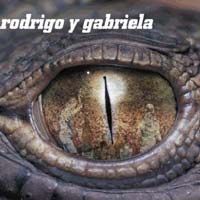
Rodrigo y Gabriela
Rodrigo y Gabriela ••••
Rubyworks
There are two things that Rodrigo y Gabriela, a pair of Mexican ex-pats now based in Dublin, want you to know above all else. One, they aren’t siblings and two, they don’t, I repeat don’t play flamenco music. It’s easy to see why one might make that mistake though; their music is certainly infused to overflowing with Latin passion. It can be frenetic and in your face, is played on nylon-strung Spanish guitars and features stirring melodies that float above energetic instrumentation that mixes percussion and guitar in equal amounts… flamenco, surely? Only if you insist on missing the point. You see, Rodrigo y Gabriela were originally members of Tierra Acida, one of Mexico’s premier metal bands, before quitting for Europe in 1999. So, yes, the music does contain flamenco elements but it mines a cluster of other genres too – pop, classical, funk, heavy metal and Al di Meola-esque jazz fusion – all performed on acoustic guitars. Having already gained a glowing reputation as a live act and assorted critical dribblings with their previous albums Re-Foc and Live-Manchester & Dublin, this John Leckie-produced eponymous release seems set to break them to a wider audience, and deservedly so.
While both are virtuosi in their own right, playing duties are split with Rodrigo taking the majority of the lead lines and Gabriela holding down the rhythm. However, this shouldn’t be taken to imply that she plays the subordinate role behind the male guitar hero. In fact, in many ways, it is Gabriela’s energised and muscular playing style that characterises the duo’s unique sound. Rodrigo’s fluid and emotional melodies are easy on the ear and lodge in the consciousness, and the thought occurs that this could be just the guitar style that Jimi Hendrix, Hank Marvin and John Schofield might have come up with if they’d grown up together in the hills of Andalusia. But without Gabriela’s astonishing rhythms, it could very well just be shredding. Hers truly is rhythm playing, seamlessly incorporating percussion into the chordal playing, tapping flamenco-style on golpeadores and tapping plates but goes far beyond. No part of the guitar is safe from her onslaught and so breathtakingly intricate is her playing that her right hand is often little more than a blur.
Parts of the album are truly astonishing. Somewhere a jaunty jazz motif morphs into a metal-based arpeggio solo. Somewhere else a ‘60s cop show guitar line merges into a sassy Mexican melody. ‘Ixtapa’ boasts the album’s only guest musician in the shape of violinist Roby Lakatos who liberally sprinkles it with gypsy jazz improvs. Two rather unexpected covers – Led Zeppelin’s ‘Stairway To Heaven’ and Metallica’s ‘Orion’, join the seven original numbers. Frankly, whether we really need another version of ‘Stairway…’ now that we have the definitive cover (can ya tell what it is yet?) is debatable, but fortunately Rodrigo y Gabriela free the song from its lyrical strictures and provide an entirely new take on the classic. All the signature melodies and sounds are there but in Rodrigo y Gabriela’s hands, the over-familiar aunt of your record collection becomes a suddenly attractive second cousin once removed. ‘Orion ‘is presented firmly on its own terms, underlining the duo’s determination not to be tied down by ticking the tired boxes marked genre. Certainly the opening verses utilise metal-styled riffing, but they do so in a manner that disentangles them from expectation. The dreamy slide guitar introduced towards the end shows, yet again, that the word ‘boundaries’ is not a familiar component of Rodrigo y Gabriela’s vocabulary.
This magnificently inventive album is guaranteed to have any fan of instrumental guitar music enthralled from the very first bars. Even casual music fans will surely come away from this with uplifted spirits and a goofy smile. Also, if you’re quick off the blocks, you may be able to snap up one of the limited edition copies complete with bonus DVD. Well worth the price of admission, it contains a documentary, three stunning live performances and a short tutorial showing how to capture the opening track ‘Tamacun’ in Rodrigo y Gabriela style – do try this at home folks!
Trevor Raggatt
originally published March 21st, 2006
__________________________________________________________________________________________
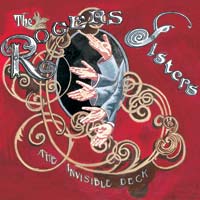
The Rogers Sisters
The Invisible Deck •••½
Too Pure
Having finally managed to break out of their slightly hipsterish leftie prison with last year’s mini-album Three Fingers, New York rockers The Rogers Sisters are back with their second full-length, The Invisible Deck. Singer/guitarist Jennifer Rogers explains that the album’s title comes from a card trick her father used to do when she and sister Laura (drums) were kids: “It’s mind-blowing, like real magic. Plus, we thought the word deck had a lot of different implications – decks are stacked and played, people and halls are decked, there are tape decks. The word invisible has a double meaning too; it can mean powerless or it can mean sneaky.”
It comes as no surprise then that the album is a thickly layered piece of work, full of distorted guitars, oddly muffled drums and slightly hypnotising vocals. The one non-related band member of the Rogers clan, singer/bassist Miyuki Furtado (no relation of Nelly) explains that they tried to experiment with writing music that had more of a classic song structure, something that better exhibited their melancholic and slightly sinister personalities. Unlike the bass- and beat-laden Three Fingers, The Invisible Deck certainly succeeds in showing off the dark side of the trio. At first sounding not unlike a bunch of stroppy children banging on the floor in frustration (indie dancefloor hit ‘Why Won’t You?’), the mood then shifts through a Scissor Sisters-in-therapy mid-section before culminating in the creepy, drugged-up and drawn out finale of ‘Sooner Or Later’.
The Rogers Sisters certainly aren’t shy of using a variety of unusual amps and guitars or of experimenting with sound through creative mic placements and covering drums with different materials. The recording mix, however, lets the usually energetic trio down; there’s hardly any dynamic range and the vocals either drown in heavy, messy guitar licks or seem strangely detached from the instrumental soundscapes. Former single ‘Emotion Control’, which was re-recorded for the album, particularly suffers. Overall, the arrangements are fairly simplistic, and apart from the use of percussion and occasional flute (see the brooding, near seven-minute epic ‘Your Littlest World’), the songs vary little instrumentally. The rhythmical structures, vocal harmonies and phrasing are also fairly consistent throughout the album. Intentional or not, with one or two notable exceptions (e.g. the bouncy, chugging ‘The Clock’), these are the kind of songs that could easily play in the background without demanding much direct attention, yet at the same time affect the mood from underneath, rather like an ‘invisible deck’ in fact.
So while it is heartening to see that The Rogers Sisters have not fallen into the trap of commercialism, choosing instead to explore and expand their musical horizons, I wouldn’t go so far as to label their latest work an ‘opus’ as they have done ever so modestly in their bio. Instead, it’s simply a document (and a worthwhile one at that) of a band that’s continuing to find and define their musical path and refusing to simply blend in with the scenery.
Anja McCloskey
originally published March 25th, 2006
__________________________________________________________________________________________

Beth Rowley
Sweet Hours EP ••••
Self-released
With her delicate features framed by blonde pre- Raphaelite curls, Beth Rowley looks anything but a smokin’ jazz-soul diva. Excepting some serious Milli Vanilli-style shenanigans, however, that’s exactly what she is. Boasting an extraordinary voice that could melt a heart of anthracite, a lazier scribe would attest to a certain Joss Stone-like quality, but Rowley’s is a rawer, more affecting talent. Combining a clarity and strength of spirit with bluesy and often sulty undertones, flecks of jazz and blues blend flawlessy with soul and even gospel to concoct a bewitching brew. While last year’s self-titled debut EP concentrated more on the former, the brand new Sweet Hours effortlessly stretches out to encompass them all, and sounds the more outstanding for it.
The traditional number ‘Nobody’s Fault But Mine’ is Rowley at her most vocally isolated and vulnerable. A tender whisper here, a despairing wail of anguish there, it’s a real floor-filler as everyone around her swoons in admiration. ‘How Could You Ever Leave’ has a more contemporary soul / R’n’B styling, but is once again delivered in a manner that knocks the cork placemats off those other young upstarts venturing into this territory. Coffee table music it ain’t. The title track, also co-written with producer/saxophonist Ben Castle (son of Roy), mainlines a lite soul flavour and makes a satisfying pop song. Elsewhere, ‘Magazines’ sees Rowley kicks off her shoes and hit the dancefloor barefoot with a tasty melange fusing the best of Stax and Motown with a frenetic Tower of Power delivery. Funky horns soar over a solid rhythm track as the words, recounted with her tongue planted firmly in cheek, recite a hymn of thanks to the modern woman’s fount of all knowledge; “Should I lose weight or should I buy bigger chairs? It’s good to know that somebody cares!”, she sings, gleefully playing it large.
The EP closes with a pair of unusual covers. George Formby’s ‘Leaning On A Lamp-post’ (wait!… hear her out) is barely recognisable as Rowley sublimely subverts the gimmicky, ukulele-banjo associations to deliver her smouldering blues with boogie woogie-tinged piano. It’s the boldest transformation since Tori Amos heartily ravished the Chas & Dave ditty, ‘London Girls’. The Ronettes classic ‘Be My Baby’ also gets the full Beth Rowley remake treatment, morphing into doo-wop jazz with a cosseting harmony so close it practically stalks the melody. Melded with rich and syrupy double bass, the song’s astonishing vocal arrangement is a strange but stunning coda. Fans of these covers would do well to seek out the first EP for an authoritative take on T-Bone Walker’s ‘Stormy Monday’, which Rowley bends to her will and successfully conveys a world-weary knowingness far beyond her youth.
There’s no doubt that Rowley has the ability and, most importantly, the likeability to bring authentic but accessible jazz and blues to a mainstream audience. With her vocals and interpretative skills already seemingly head and shoulders above the other populist jazzers – Melua, Cullum, Bublé and the like – it would only take a kind twist of fate for Rowley to graduate from Carleen Anderson’s backing singer to a homegrown singular talent every bit as revered.
Trevor Raggatt
originally published January 28th, 2006
__________________________________________________________________________________________

Bic Runga
Live at Lock 17 ••••
March 1st, 2006
When the soundtrack of my formative years takes to the stage, the technician doesn’t even bother to turn the lights down, perhaps sensing the already feverish anticipation of the crowd. Mostly jammed with fellow New Zealanders, the sold-out venue swells with applause as the object of their affection greets them with a simple “Hi, nice to see you” before launching straight into her greatest hit ‘Sway’ from 1998’s debut album Drive. Shrugging her shoulders as if to say “well what other song would I start with?,” Runga affably commands the attention of everyone before getting a fit of the giggles midway through the song. But rather than being greeted with a good natured heckle, the besotted crowd stand still and quiet, hanging on Runga’s every word, me included. She’s a connection to our distant homeland, someone who transports us back to a precious time and place and lets us forget our aching feet and crappy jobs.
Wearing a black vintage-style dress to match her newly-cropped glossy black hair and dusky eye shadow, Bic stands with one hand in her pocket and the other on the mic, clearly quite comfy in her own way. For someone who regularly sells out venues umpteen times the size of Lock 17, the set is very simple; just a black curtain, red lighting, Neil Finn on the piano and a guitarist whose name I don’t quite catch. The Finn connection goes back a few years. A self-proclaimed Runga fan, Finn asked her to co-headline a sold-out tour (also with John Dobbyn) before adding harmonies and flourishes to her 2002 album Beautiful Collision and the new one, Birds. Released in New Zealand last November, the album finally gets its UK release in May, and our first taste of it comes with second song ‘Captured’. Runga’s clear, soothing and peaceful vocal wraps itself around the accompaniment; it’s hard to believe that a song with such a mysterious, ghost-like quality can be carried so expertly by just three (albeit very talented) individuals.
Introducing ‘Say After Me’ as the future first single to be taken from Birds (surprisingly not ‘Winning Arrow’ as in other territories), Runga knowingly adds “the whole song is real depressing” before clicking her fingers and counting her compadres in. Proving that she can be a very intense performer when the situation calls for it, Runga tends to either close her eyes so tightly as to concentrate immensely on every note or to stand deathly still looking straight out at the crowd. Tonight, her expert manipulation of the tension climaxes with ‘It’s Over”, during which she appears to become genuinely upset and uneasy with the memories invoked. It’s no surprise really, many of these new songs sprang directly from the death of her father in 2005. But as the evening continues, she begins to get more playful with the audience. She starts a song or two with springy little dances, claps and laughs with the band and asks endearingly dappy things such as “how does it go again?” and “do I play in this one?”, to which one of them answers “if you want to!” and she does.
After just 10 songs she says goodnight and departs the stage with her band, but we’re having none of it. And when she returns to play the new album’s title track, a loud rippling “shhh!” rushes round the room. Clearly us Kiwis are eager to prolong the feeling of home. As the darkly dramatic number draws to a close, Runga thanks the boys and proceeds to do another two alone; the worldly wise ‘No Crying No More’ and harking back to her younger days with ‘Drive’. Then with a smile and a wave she departs with a promise – “see you in a couple of months!” On the strength of tonight’s performance, it might finally be time for Runga’s career to take flight in Britain.
Julia Paynter
originally published March 18th, 2006
__________________________________________________________________________________________
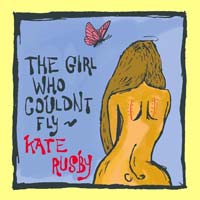
Kate Rusby
The Girl Who Couldn’t Fly ••••
Pure Records
Objectivity is rarely an option where the music of Kate Rusby is concerned. Since her deserving nomination (and, for that matter, cruelly robbed loss – Talvin Singh, where are you now?) as the ‘token folkie’ for the 1999 Mercury Music Prize, she has released album after album of exquisitely winsome, unsullied beauty, and this, her fifth, is no exception. In fact, if you’ve liked any of her previous releases, why read any further? Part with that cash! So sure-footed is she that to question the consistency of this album is to verge on the blasphemous. Rusby knows what she loves and what she does best, and by happy coincidence, enough people seem to agree wholeheartedly. Yet despite the unbroken, no repairs approach, there are enough clues here to make us aware that she’s still growing.
Though always a strong collaborative artist, most of Rusby’s pairings have been with artists themselves immersed in the British and American folk scenes, with the exception of Ocean Colour Scene’s Simon Fowler’s guest vocal on 2003’s Underneath The Stars. Here, not only has former Blur guitarist Graham Coxon provided the album artwork, but Roddy Woomble, lead singer with Scottish rockers Idlewild, improbably appears on no less than three tracks. As ever though, the most important collaborator is Rusby’s husband, John McCusker, an impressive multi-instrumentalist and member of The Battlefield Band. With an array of talented musicians, Rusby’s pure, endearing vocals are deftly backed by double bass, harmonium, euphonium, flutes and whistles, all serving to blur the distinction between the results of Rusby’s own evolving songwriting and those of a more traditional nature. So much so that it’s easy not to realise on first listen that seven of these songs are her own.
As is her wont, Rusby also throws a cover into the mix – previous albums have seen reinterpretations of Suzanne Vega’s ‘The Queen & The Soldier’, Richard and Linda Thompson’s ‘Withered & Died’ and ‘Old Town’ by Iris DeMent – and this time it’s not a great deal more leftfield. The jazz standard, ‘You Belong To Me’, has been recorded by everyone from Ella Fitzgerald and Judy Garland to Tori Amos and Bob Dylan, and Rubsy does it justice in her own unflourished, mellow style. Elsewhere, ‘Bonnie House Of Airlie’ is a thundering blood feud epic based on the tale of ‘Bonnie’ Prince Charlie, ‘Game Of All Fours’ tells the engrossing tale of a high-stakes card game between a girl and boy, and ‘Wandering Soul’ is a rousing number reminiscent of ‘Canaan’s Land’ from Little Lights that was previously issued on the soundtrack to the BBC series, ‘Billy Connolly’s Musical Tour of New Zealand’. It should have you and anyone else in the vicinity singing along with gusto. Take it from me, the practice will come in useful should you ever see a Rusby live show – she’ll be right impressed!
One of the standout tracks, ‘A Ballad’, is a significant change in pace and subject, telling the story of a bride who discovers her cheating husband-to-be up to no good on the morning of their wedding. But rather than getting her parents to seek him out and clout him, as is the norm in English folk, she does herself in; cheerful it’s not, but unendingly gorgeous. And don’t worry, if that gets you down, the cute little hidden track, ‘Little Jack Frost’, is the pick-you-upper theme tune to the BBC’s adorable Christmas animation that lit up the schedules last year.
Is Rusby herself the girl afraid to fly? Certainly not musically, but apparently so in the flesh – the title was inspired by a conversation with a friend about a trip to the Maldives. So whilst it might take a hypnotist for that boduberu and Indian pot dance album to materialise, for now The Girl Who Couldn’t Fly simply reaffirms our faith well-placed in Rusby’s very special brand of Britishness.
Matthew Smith
originally published December 12th, 2005
__________________________________________________________________________________________

Alice Russell
Under The Munka Moon II •½
Tru Thoughts
Under The Munka Moon II is the third album from contemporary soul artist Alice Russell and an apparent sequel to her debut in more than just name. Although the interim release, My Favourite Letters, demonstrated that Russell is able to work inside the traditional album template and create her own sound, like the first installment, Under The Munka Moon II essentially rests on collaborations. It’s enough to make you wonder whether, with this revisit to partnerships, Russell is able to sustain her own career. That, and the fact that Russell wears her influences so heavily her confession that she loves Aretha Franklin, Minnie Riperton and Stevie Wonder can only be viewed with light amusement.
That’s not to say that this new release is worthless. Her cover of ‘Seven Nation Army’, in which Nostalgia 77 sneak in, plods at points and lacks the fever of the White Stripes original but Russell has a lot more oomph than soul ‘wunderkind’ Joss Stone and deserves far more respect for her attempt. ‘Hurry On Now’ attempts to introduce a light-hearted reggae-driven beat under Russell’s soulful vocal but perhaps falls at the last hurdle, which is a shame.
Elsewhere, ‘A Fly In The Hand’ might have the average radio listener typing in ‘soul’, ‘Aretha Franklin’ and ‘gospel’ into Google, completely unaware that the material is new, and this is fundamentally the album’s downfall. The listener can look past the multitudes of ‘help’ Russell has received and listen to Under The Munka Moon II for what it is worth, but eventually they will realise their Best Soul Album In The World…Ever! compilation has been gathering dust and once more completely forget about Russell.
Russell struggles throughout to find her feet and create a new, wantingly unexpected sound. Were she to polish a few of these songs up she would find herself in a much more saleable position, but as it is the album is barely strong enough to support its own cast.
Tiffany Daniels
previously unpublished
__________________________________________________________________________________________
